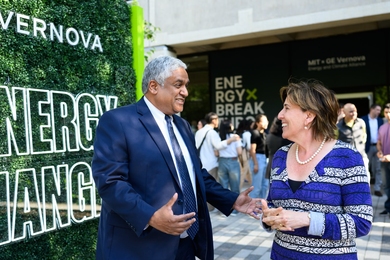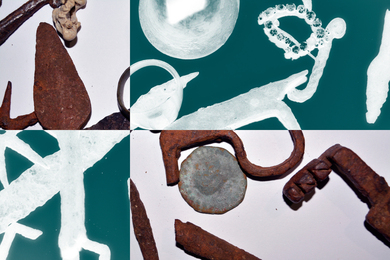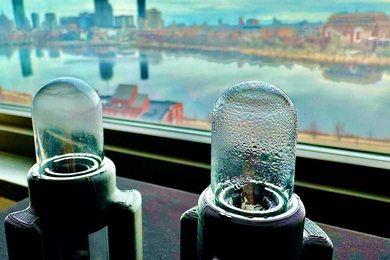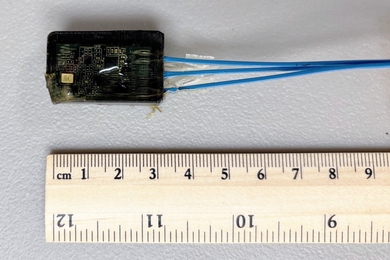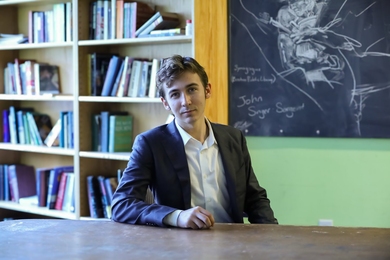The inauguration of L. Rafael Reif as MIT’s 17th president presents the Institute with a splendid occasion to showcase its long-standing and highly creative engagement with music in its many forms. To begin, a concert by the Caracas Brass, an offshoot of the famous Simón Bolívar Orchestra of Venezuela, will sound a brilliant fanfare for the larger celebration.
“More and more people are realizing that MIT is a hub of the arts,” says Evan Ziporyn, Kenan Sahin Distinguished Professor of Music at MIT. Music is thoroughly woven into the fabric of the Institute, in ways that may be surprising to some. Ziporyn notes that people expect to find advanced computer music and high-tech experiments as well as classical music, and certainly those are fields in which the MIT community excels. What they don’t expect is the dynamic range of jazz, hip-hop, classical composition, musical theatre and world music that emanates from all corners of the Institute.
In part, this musical effusion simply reflects the student body. An astonishing 68 percent of current MIT undergraduates have advanced musical aptitude, and a full third of undergraduates participate in some kind of musical endeavor, whether it is private lessons or performance in groups that range from a capella trios to Balinese gamelan to the MIT Symphony Orchestra and the Festival Jazz Ensemble. MITHAS, the MIT group dedicated to the Heritage of the Arts of South Asia, has become a lead presenter of South-Asian performing arts in the Boston area, according to Ziporyn.
The breadth and depth of music at MIT will be on full display for the inauguration itself, all coordinated by Frederick Harris Jr., who is music director of the MIT Wind Ensemble and Festival Jazz Ensemble among many other responsibilities. Music will be performed by several groups, including the MIT Ceremonial Brass, Rambax MIT and the MIT Chorallaries, in addition, Institute Professor John Harbison will lead students, faculty and staff in a work he composed in honor of L. Rafael Reif. As Frederick Harris puts it, “A lot of creativity and imagination has gone into the creation of music for the events; new musical partnerships are being formed and everyone involved is stretching themselves. Even before a note has been officially played or sung, we're all feeling a sense of esprit de corps. The name of the music faculty jazz combo that is performing at the gala dinner is Strength in Numbers. That says it all.”
Deborah Fitzgerald, Kenan Sahin Dean of MIT’s School of Humanities, Arts, and Social Sciences, notes that the Institute’s commitment to music and other arts also “reflects our understanding that generating practical solutions for great challenges requires deep creativity, and an understanding of the world’s complexities — political, economic and cultural. Experience in the arts and humanities empowers young engineers and scientists with cultural and historical perspective, creative capacities, and critical thinking skills for navigating the contexts in which they will work — so their vital innovations can succeed.”
MIT is outstanding among institutions of higher learning, especially institutes of science and technology, in its excellent faculty composers and performers and support of musical study and performance. The competitive Emerson Scholarship/Fellowship Program offers free private lessons to 50 exceptional students every year. MIT’s new Center for Art, Technology & Science (CAST), supported by a generous grant from the Andrew W. Mellon Foundation, is dedicated to increasing the integration of arts into curricula and research endeavors, not only at the Institute but globally. And the MIT Council for the Arts, founded in 1972 by then-president Jerome Wiesner, harnesses a volunteer group of alumni and friends to encourage art and music participation at every level of the Institute and to raise funds for grants, awards, and programming.
The Council’s commitment to fostering leadership in the integration of art and music into society, learning, and research was never more visible than when, in 2010, it awarded its highest honor, the prestigious Eugene McDermott Award in the Arts at MIT, to conductor Gustavo Dudamel, who is currently music director of the Los Angeles Philharmonic, principal conductor of the Gothenburg Symphony in Sweden, and artistic director of the Simón Bolívar Orchestra of Venezuela. The McDermott Award brought Maestro Dudamel to campus in April of 2010 for an exciting residency, during which he conducted an open rehearsal with the MIT Symphony Orchestra and participated in a panel discussion with two award-winning MIT professor/composers, John Harbison and Tod Machover, moderated by PBS journalist Maria Hinojosa.
The remarkable career of the 31-year-old Dudamel, who brings infectious enthusiasm, brilliant musicianship, and an unruly mop of hair to every endeavor in which he takes part, had its inception in El Sistema, Venezuela’s path-breaking youth music program. The brainchild of economist and musician José Antonio Abreu, El Sistema was founded in 1975 with a single youth orchestra; over time the mission and reach of El Sistema, also called Social Action for Music, have expanded dramatically to comprise 31 regional symphony orchestras, supporting the instruction of more than 300,000 children at any given time. Its mission is not just to bring musical training to any Venezuelan child who expresses interest, regardless of location or income — though it does so — but to create citizens. In an interview with author Tricia Tunstall, who wrote Changing Lives (2012) about Dudamel and El Sistema, Abreu said of his first, tentative youth ensemble in Caracas, “I realized that the orchestra was actually a model of community, because it taught both solidarity and social discipline ... To me, an orchestra is first and foremost a way to encourage better human development within children.” Dudamel, the son of a trombonist and a voice teacher, joined El Sistema in his home city of Barquisimeto as a small child and began occasional conducting stints in the youth orchestra at age 11.
Dudamel may be the Sistema’s most meteoric success, but the program’s benefits have been most visible among the less affluent villages and urban neighborhoods where the program helps young people find purpose, discipline, and hope — and sometimes a career in music or instrument-making — instead of discouragement and delinquency. Tunstall quotes Maestro Abreu: “Poverty is not just a lack of a roof or bread. It is also a spiritual lack—a loneliness and lack of recognition. The vicious cycle of poverty can be broken when a child poor in material possessions acquires spiritual wealth through music.”
The crown jewel of El Sistema is the Simón Bolívar Orchestra, of which Mr. Dudamel was appointed music director in 1999, at the age of 18. Ten young members of that orchestra have formed the Caracas Brass, an ensemble of horns and percussion that has toured internationally to great acclaim. Its young members warmly endorse the tenets of El Sistema.
Roman Granda, a Cuban-born trumpet player in the ensemble who joined a “nucleo” of El Sistema in 1996, commented, “All of us, as beneficiaries of El Sistema, have been very blessed. We have had the opportunity to attend lessons with some of the A-list musicians of the previous and our generation not only from our own country, but from all over the world, a great input for our education. To have the opportunity to perform in some of the most relevant venues all over the world implies a great commitment with your art and your country, and all of these translate into a better individual, a more mature musician and a more developed human being.”
Performing, teaching, and outreach work in tandem in El Sistema, as they do at MIT. Alejandro Diaz, a Caracas Brass trombonist who joined the “nucleo” in his native city of San Cristobal at age 9, observes, “Whenever we perform, either with the orchestra or with an ensemble, the adrenaline is always rushing, the excitement is always there and that’s what keeps us carrying on with the mission of bringing more and more children and young people to the program, showing the world that we love what we do.”
On Sept. 20, the Caracas Brass will be giving a celebratory concert in honor of the inauguration of L. Rafael Reif as MIT’s 17th president, sponsored by the Council for the Arts at MIT. The ensemble will present a sophisticated program of classical and contemporary works, including works by Vivaldi, Bach, Mendelssohn and trumpet-maestro Enrique Crespo. The concert at Kresge Auditorium begins at 8 p.m.. It is free and open to the MIT community, but tickets must be reserved in advance. For further information and to register, visit http://www.regonline.com/MITinauguration2012-ceremony
“More and more people are realizing that MIT is a hub of the arts,” says Evan Ziporyn, Kenan Sahin Distinguished Professor of Music at MIT. Music is thoroughly woven into the fabric of the Institute, in ways that may be surprising to some. Ziporyn notes that people expect to find advanced computer music and high-tech experiments as well as classical music, and certainly those are fields in which the MIT community excels. What they don’t expect is the dynamic range of jazz, hip-hop, classical composition, musical theatre and world music that emanates from all corners of the Institute.
In part, this musical effusion simply reflects the student body. An astonishing 68 percent of current MIT undergraduates have advanced musical aptitude, and a full third of undergraduates participate in some kind of musical endeavor, whether it is private lessons or performance in groups that range from a capella trios to Balinese gamelan to the MIT Symphony Orchestra and the Festival Jazz Ensemble. MITHAS, the MIT group dedicated to the Heritage of the Arts of South Asia, has become a lead presenter of South-Asian performing arts in the Boston area, according to Ziporyn.
The breadth and depth of music at MIT will be on full display for the inauguration itself, all coordinated by Frederick Harris Jr., who is music director of the MIT Wind Ensemble and Festival Jazz Ensemble among many other responsibilities. Music will be performed by several groups, including the MIT Ceremonial Brass, Rambax MIT and the MIT Chorallaries, in addition, Institute Professor John Harbison will lead students, faculty and staff in a work he composed in honor of L. Rafael Reif. As Frederick Harris puts it, “A lot of creativity and imagination has gone into the creation of music for the events; new musical partnerships are being formed and everyone involved is stretching themselves. Even before a note has been officially played or sung, we're all feeling a sense of esprit de corps. The name of the music faculty jazz combo that is performing at the gala dinner is Strength in Numbers. That says it all.”
Deborah Fitzgerald, Kenan Sahin Dean of MIT’s School of Humanities, Arts, and Social Sciences, notes that the Institute’s commitment to music and other arts also “reflects our understanding that generating practical solutions for great challenges requires deep creativity, and an understanding of the world’s complexities — political, economic and cultural. Experience in the arts and humanities empowers young engineers and scientists with cultural and historical perspective, creative capacities, and critical thinking skills for navigating the contexts in which they will work — so their vital innovations can succeed.”
MIT is outstanding among institutions of higher learning, especially institutes of science and technology, in its excellent faculty composers and performers and support of musical study and performance. The competitive Emerson Scholarship/Fellowship Program offers free private lessons to 50 exceptional students every year. MIT’s new Center for Art, Technology & Science (CAST), supported by a generous grant from the Andrew W. Mellon Foundation, is dedicated to increasing the integration of arts into curricula and research endeavors, not only at the Institute but globally. And the MIT Council for the Arts, founded in 1972 by then-president Jerome Wiesner, harnesses a volunteer group of alumni and friends to encourage art and music participation at every level of the Institute and to raise funds for grants, awards, and programming.
The Council’s commitment to fostering leadership in the integration of art and music into society, learning, and research was never more visible than when, in 2010, it awarded its highest honor, the prestigious Eugene McDermott Award in the Arts at MIT, to conductor Gustavo Dudamel, who is currently music director of the Los Angeles Philharmonic, principal conductor of the Gothenburg Symphony in Sweden, and artistic director of the Simón Bolívar Orchestra of Venezuela. The McDermott Award brought Maestro Dudamel to campus in April of 2010 for an exciting residency, during which he conducted an open rehearsal with the MIT Symphony Orchestra and participated in a panel discussion with two award-winning MIT professor/composers, John Harbison and Tod Machover, moderated by PBS journalist Maria Hinojosa.
The remarkable career of the 31-year-old Dudamel, who brings infectious enthusiasm, brilliant musicianship, and an unruly mop of hair to every endeavor in which he takes part, had its inception in El Sistema, Venezuela’s path-breaking youth music program. The brainchild of economist and musician José Antonio Abreu, El Sistema was founded in 1975 with a single youth orchestra; over time the mission and reach of El Sistema, also called Social Action for Music, have expanded dramatically to comprise 31 regional symphony orchestras, supporting the instruction of more than 300,000 children at any given time. Its mission is not just to bring musical training to any Venezuelan child who expresses interest, regardless of location or income — though it does so — but to create citizens. In an interview with author Tricia Tunstall, who wrote Changing Lives (2012) about Dudamel and El Sistema, Abreu said of his first, tentative youth ensemble in Caracas, “I realized that the orchestra was actually a model of community, because it taught both solidarity and social discipline ... To me, an orchestra is first and foremost a way to encourage better human development within children.” Dudamel, the son of a trombonist and a voice teacher, joined El Sistema in his home city of Barquisimeto as a small child and began occasional conducting stints in the youth orchestra at age 11.
Dudamel may be the Sistema’s most meteoric success, but the program’s benefits have been most visible among the less affluent villages and urban neighborhoods where the program helps young people find purpose, discipline, and hope — and sometimes a career in music or instrument-making — instead of discouragement and delinquency. Tunstall quotes Maestro Abreu: “Poverty is not just a lack of a roof or bread. It is also a spiritual lack—a loneliness and lack of recognition. The vicious cycle of poverty can be broken when a child poor in material possessions acquires spiritual wealth through music.”
The crown jewel of El Sistema is the Simón Bolívar Orchestra, of which Mr. Dudamel was appointed music director in 1999, at the age of 18. Ten young members of that orchestra have formed the Caracas Brass, an ensemble of horns and percussion that has toured internationally to great acclaim. Its young members warmly endorse the tenets of El Sistema.
Roman Granda, a Cuban-born trumpet player in the ensemble who joined a “nucleo” of El Sistema in 1996, commented, “All of us, as beneficiaries of El Sistema, have been very blessed. We have had the opportunity to attend lessons with some of the A-list musicians of the previous and our generation not only from our own country, but from all over the world, a great input for our education. To have the opportunity to perform in some of the most relevant venues all over the world implies a great commitment with your art and your country, and all of these translate into a better individual, a more mature musician and a more developed human being.”
Performing, teaching, and outreach work in tandem in El Sistema, as they do at MIT. Alejandro Diaz, a Caracas Brass trombonist who joined the “nucleo” in his native city of San Cristobal at age 9, observes, “Whenever we perform, either with the orchestra or with an ensemble, the adrenaline is always rushing, the excitement is always there and that’s what keeps us carrying on with the mission of bringing more and more children and young people to the program, showing the world that we love what we do.”
On Sept. 20, the Caracas Brass will be giving a celebratory concert in honor of the inauguration of L. Rafael Reif as MIT’s 17th president, sponsored by the Council for the Arts at MIT. The ensemble will present a sophisticated program of classical and contemporary works, including works by Vivaldi, Bach, Mendelssohn and trumpet-maestro Enrique Crespo. The concert at Kresge Auditorium begins at 8 p.m.. It is free and open to the MIT community, but tickets must be reserved in advance. For further information and to register, visit http://www.regonline.com/MITinauguration2012-ceremony

